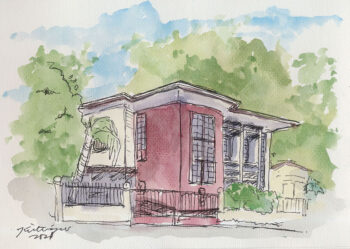DAVAO CITY (MindaNews / 19 Sep) – The City Council here approved on second reading Tuesday the amendments in the 2013 Comprehensive Zoning Ordinance seeking to expand the protection of and to encourage environment-friendly developments at the 222-hectare Shrine Hills identified as Urban Ecological Enhancement Sub-Zone (UEESZ).
Interface Development Interventions (IDIS) executive director Chinkie Peliño-Golle lauded the local lawmakers for exercising “the political will in favor of the general public and the environment” in passing the critical amendments to the five-year ordinance.
She added that amendments will provide landowners and developers with more options on what projects to pursue at Shrine Hills.
“We are optimistic that after this, the local government will finally work with the landowners and developers in appropriate management schemes and hopefully, parks will be established in Shrine Hills aside from the residential buildings,” Golle said.
The proposed amendments expounded the provisions under Section 3 for the City Government “to manage, protect, conserve, and implement greening programs in areas determined as prone to natural hazards and deemed critical in providing the ecological balance and enhancement in the city’s urban zones.”
Once passed into law, the city will promote environmental stability and biodiversity conservation initiatives; enhance climate change mitigation and adaptation measures in the UEESZ areas; promote and establish privately-owned public open spaces; and urge the consolidated effort of private landowners and all stakeholders through massive greening programs.
Golle said only greening activities are allowed in the Shrine Hills under the existing ordinance but proposed amendments seek to allow developments provided that project proponents meet certain requirements such as “limited development with the barest minimum alteration of the top soil, the slope, and the overall geo-physical characteristic of the area.”
The Davao City Local Zoning Review Committee, a recommendatory body created under the 2013 Comprehensive Zoning Ordinance, pushed these proposed amendments.
The ordinance allows no-till agricultural activities at the Shrine Hills, a landslide prone area, and low-impact eco-tourism projects like eco-tourism facilities or parks.
With the proposed amendments, the City Government will also offer incentives to landowners to encourage them develop eco-tourism amenities to spur economic activities at the Shrine Hills but the “construction area limitation for the Eco-Tourism Park shall be up to a maximum of 25% of the total lot area so that the remaining 75% will be devoted for greening.”
Amenities and facilities that would be allowed are refreshment parlor, gadgets/sports retail/rental shop, elevated walkway/trail, hanging bridges, view deck/observatory spaces, rapelling and rock climbing, botanical garden, endemic animal sanctuary, petting zoo, wellness facility, and chapel.
It also states that landowners who do not wish to participate in any land consolidation activities for revenue-generating eco-tourism projects can construct a residential building, provided that the lot was acquired prior to the effectivity of the 2013 Zoning Ordinance amendment, except if the property was acquired through hereditary succession; applicant/landowner has no other property classified as residential for zoning purposes anywhere in Davao City; and area/land subject of the application on which the residential building will be constructed is outside the highly susceptible to landslide area.
The ordinance will also create an Urban Ecological Enhancement Sub-Zone Committee with Mayor Sara Duterte as chair or her City Administrator and heads of the City Planning and Development Office and City Engineer’s Office as vice chairpersons and members coming from the City Council, City Legal, City Assessor, City Environment and Natural Resource Office, Mines and Geosciences Bureau, Philippine Institute of Civil Engineers, two representatives from non-government organizations, another two from the private sector to be appointed by the city mayor, and representatives from the United Architects of the Philippines District 1 Davao Chapter and Urban Ecological Enhancement Sub-Zone area.
The committee will be tasked to review all preliminary approval and local clearance granted to subdivision developers; conduct comprehensive research and studies and adopt long-term measures aimed at environmental promotion and development of UEESZ; and identify and determine areas in the city appropriate for rezoning as UEESZ and propose changes of land use to the City Council. (Antonio L. Colina IV / MindaNews)
